HI6026: Auditor's Public Interest Responsibilities and Audit Quality
VerifiedAdded on 2023/04/25
|19
|4448
|295
Report
AI Summary
This report provides a comprehensive analysis of auditor's public interest responsibilities and their impact on audit quality. It begins by examining the role of audit independence and whistleblowing in uncovering unethical activities within business organizations, emphasizing the importance of ethical conduct in financial reporting. The report then analyzes key stakeholders such as investors, business partners, employees, and customers, assessing how material misstatements can affect their decisions. It delves into the lessons learned from the Enron scandal and Arthur Andersen's behavior, highlighting the need for improved audit quality and stricter regulations to prevent future collapses. The report also discusses audit strategies to address warning signs and ensure compliance with professional standards, with a focus on the APES 110 code of ethics. Finally, it underscores the importance of auditor independence and the implementation of effective governance mechanisms to safeguard the interests of stakeholders. The report concludes by summarizing key findings and recommendations for enhancing audit quality and maintaining public trust in the accounting profession.
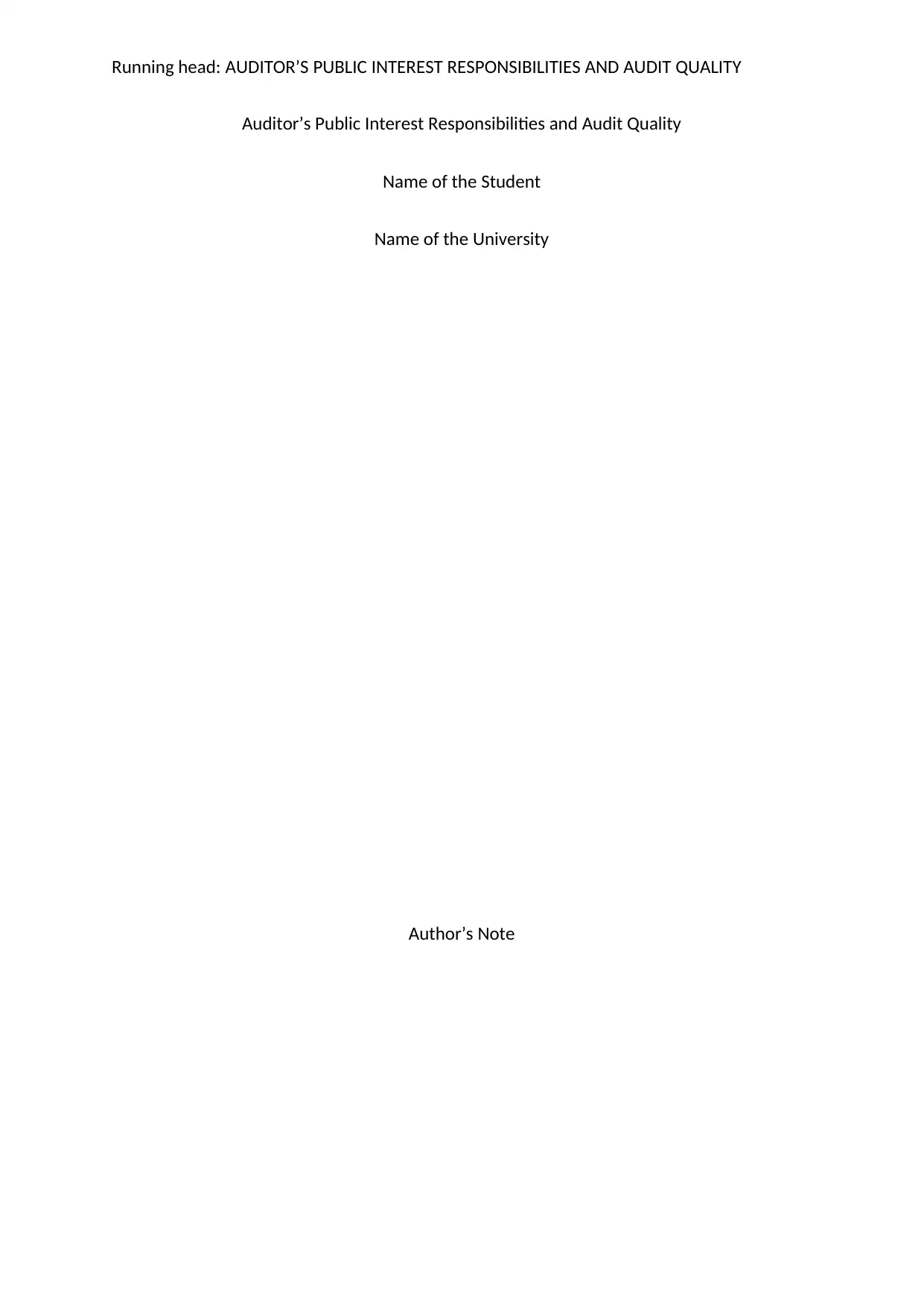
Running head: AUDITOR’S PUBLIC INTEREST RESPONSIBILITIES AND AUDIT QUALITY
Auditor’s Public Interest Responsibilities and Audit Quality
Name of the Student
Name of the University
Author’s Note
Auditor’s Public Interest Responsibilities and Audit Quality
Name of the Student
Name of the University
Author’s Note
Paraphrase This Document
Need a fresh take? Get an instant paraphrase of this document with our AI Paraphraser
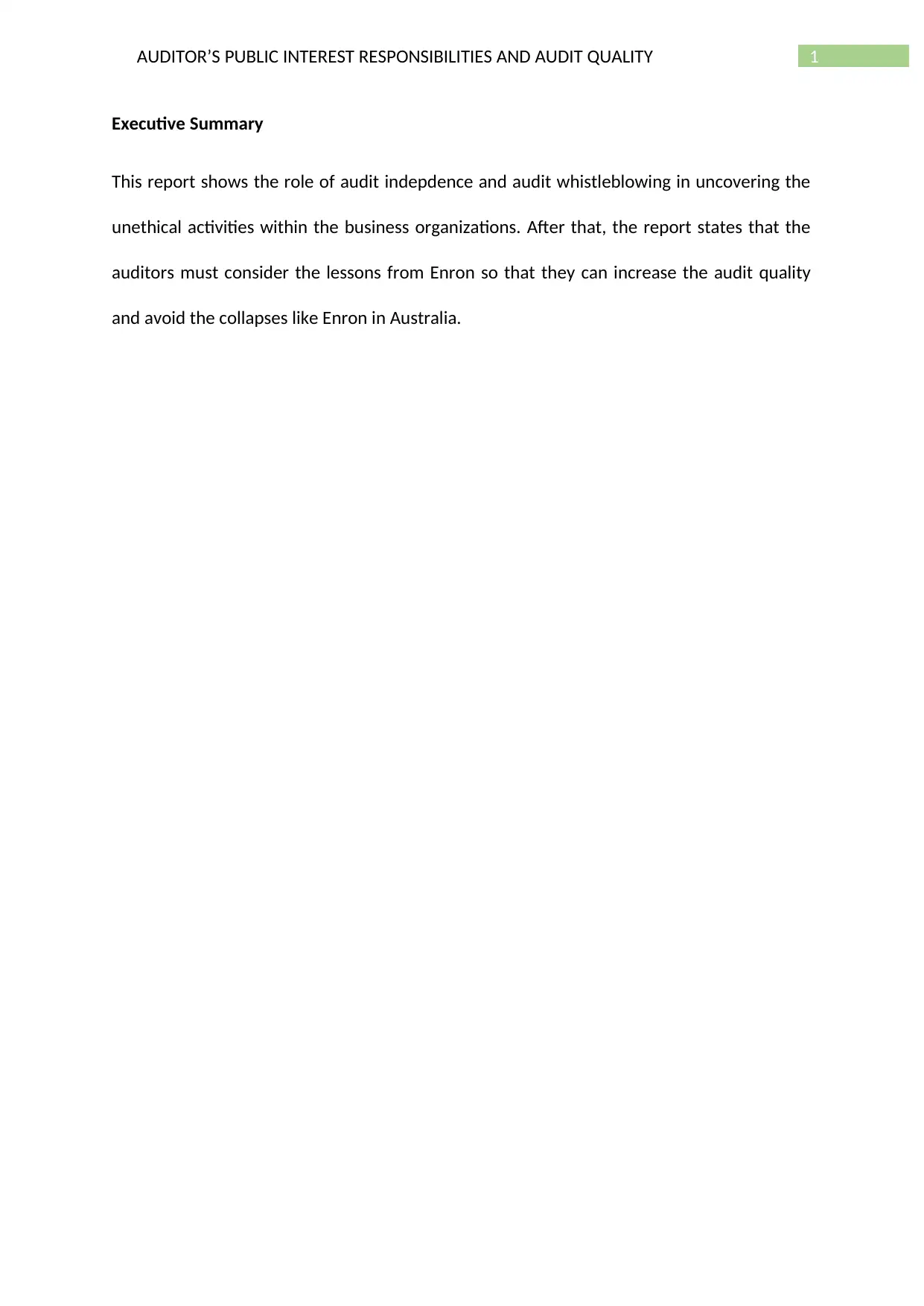
1AUDITOR’S PUBLIC INTEREST RESPONSIBILITIES AND AUDIT QUALITY
Executive Summary
This report shows the role of audit indepdence and audit whistleblowing in uncovering the
unethical activities within the business organizations. After that, the report states that the
auditors must consider the lessons from Enron so that they can increase the audit quality
and avoid the collapses like Enron in Australia.
Executive Summary
This report shows the role of audit indepdence and audit whistleblowing in uncovering the
unethical activities within the business organizations. After that, the report states that the
auditors must consider the lessons from Enron so that they can increase the audit quality
and avoid the collapses like Enron in Australia.

2AUDITOR’S PUBLIC INTEREST RESPONSIBILITIES AND AUDIT QUALITY
Table of Contents
1. Introduction............................................................................................................................3
2. Analysis of Key Stakeholders..................................................................................................3
3. Independence, Whistleblowing and Public Interest Requirements......................................5
4. Lessons from Enron Scandal and Arthur Andersen...............................................................6
5. Audit Quality and Audit Strategies to Address Warning........................................................9
6. Conclusion............................................................................................................................12
7. References............................................................................................................................14
8. Appendices...........................................................................................................................17
Table of Contents
1. Introduction............................................................................................................................3
2. Analysis of Key Stakeholders..................................................................................................3
3. Independence, Whistleblowing and Public Interest Requirements......................................5
4. Lessons from Enron Scandal and Arthur Andersen...............................................................6
5. Audit Quality and Audit Strategies to Address Warning........................................................9
6. Conclusion............................................................................................................................12
7. References............................................................................................................................14
8. Appendices...........................................................................................................................17
⊘ This is a preview!⊘
Do you want full access?
Subscribe today to unlock all pages.

Trusted by 1+ million students worldwide
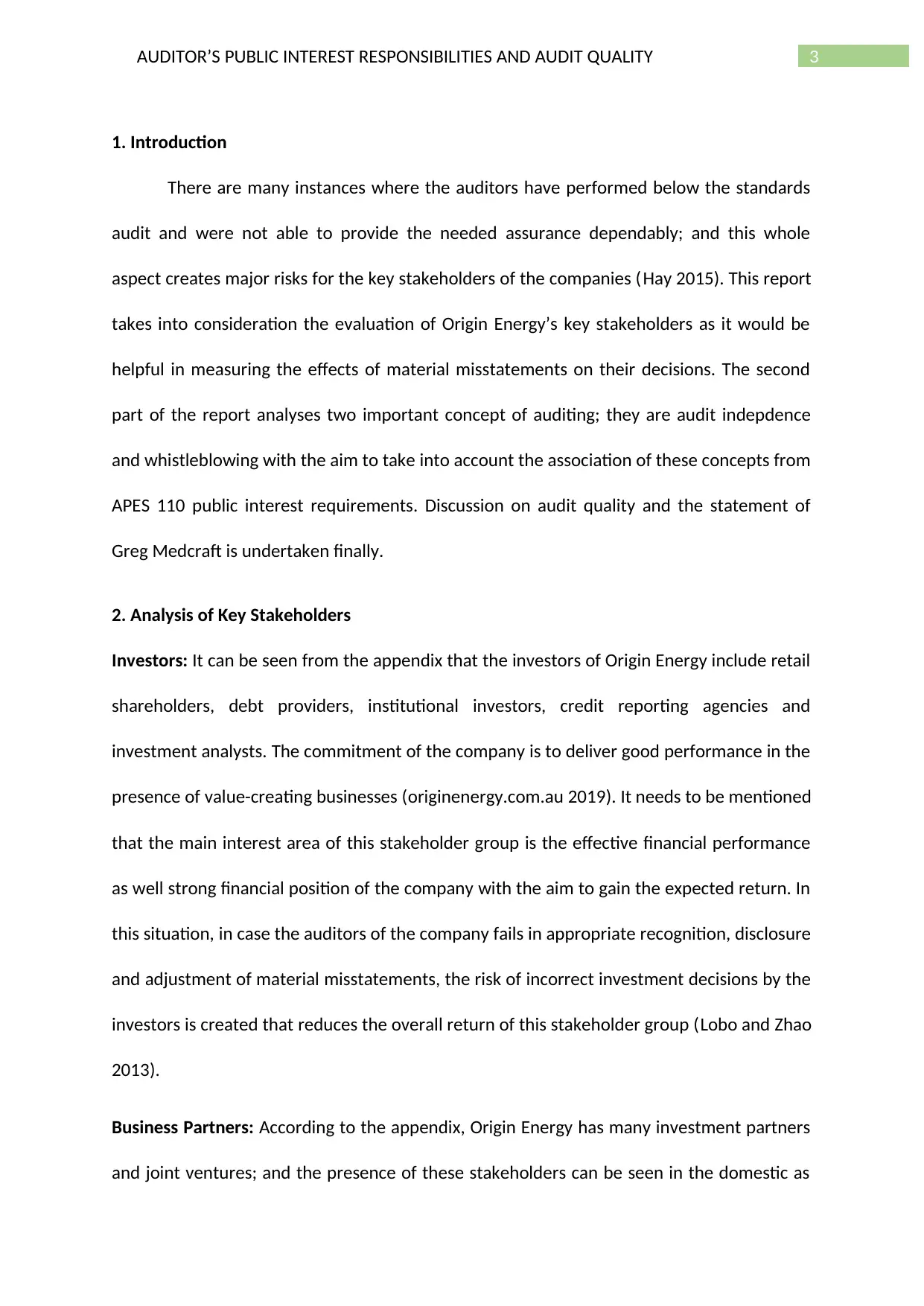
3AUDITOR’S PUBLIC INTEREST RESPONSIBILITIES AND AUDIT QUALITY
1. Introduction
There are many instances where the auditors have performed below the standards
audit and were not able to provide the needed assurance dependably; and this whole
aspect creates major risks for the key stakeholders of the companies (Hay 2015). This report
takes into consideration the evaluation of Origin Energy’s key stakeholders as it would be
helpful in measuring the effects of material misstatements on their decisions. The second
part of the report analyses two important concept of auditing; they are audit indepdence
and whistleblowing with the aim to take into account the association of these concepts from
APES 110 public interest requirements. Discussion on audit quality and the statement of
Greg Medcraft is undertaken finally.
2. Analysis of Key Stakeholders
Investors: It can be seen from the appendix that the investors of Origin Energy include retail
shareholders, debt providers, institutional investors, credit reporting agencies and
investment analysts. The commitment of the company is to deliver good performance in the
presence of value-creating businesses (originenergy.com.au 2019). It needs to be mentioned
that the main interest area of this stakeholder group is the effective financial performance
as well strong financial position of the company with the aim to gain the expected return. In
this situation, in case the auditors of the company fails in appropriate recognition, disclosure
and adjustment of material misstatements, the risk of incorrect investment decisions by the
investors is created that reduces the overall return of this stakeholder group (Lobo and Zhao
2013).
Business Partners: According to the appendix, Origin Energy has many investment partners
and joint ventures; and the presence of these stakeholders can be seen in the domestic as
1. Introduction
There are many instances where the auditors have performed below the standards
audit and were not able to provide the needed assurance dependably; and this whole
aspect creates major risks for the key stakeholders of the companies (Hay 2015). This report
takes into consideration the evaluation of Origin Energy’s key stakeholders as it would be
helpful in measuring the effects of material misstatements on their decisions. The second
part of the report analyses two important concept of auditing; they are audit indepdence
and whistleblowing with the aim to take into account the association of these concepts from
APES 110 public interest requirements. Discussion on audit quality and the statement of
Greg Medcraft is undertaken finally.
2. Analysis of Key Stakeholders
Investors: It can be seen from the appendix that the investors of Origin Energy include retail
shareholders, debt providers, institutional investors, credit reporting agencies and
investment analysts. The commitment of the company is to deliver good performance in the
presence of value-creating businesses (originenergy.com.au 2019). It needs to be mentioned
that the main interest area of this stakeholder group is the effective financial performance
as well strong financial position of the company with the aim to gain the expected return. In
this situation, in case the auditors of the company fails in appropriate recognition, disclosure
and adjustment of material misstatements, the risk of incorrect investment decisions by the
investors is created that reduces the overall return of this stakeholder group (Lobo and Zhao
2013).
Business Partners: According to the appendix, Origin Energy has many investment partners
and joint ventures; and the presence of these stakeholders can be seen in the domestic as
Paraphrase This Document
Need a fresh take? Get an instant paraphrase of this document with our AI Paraphraser
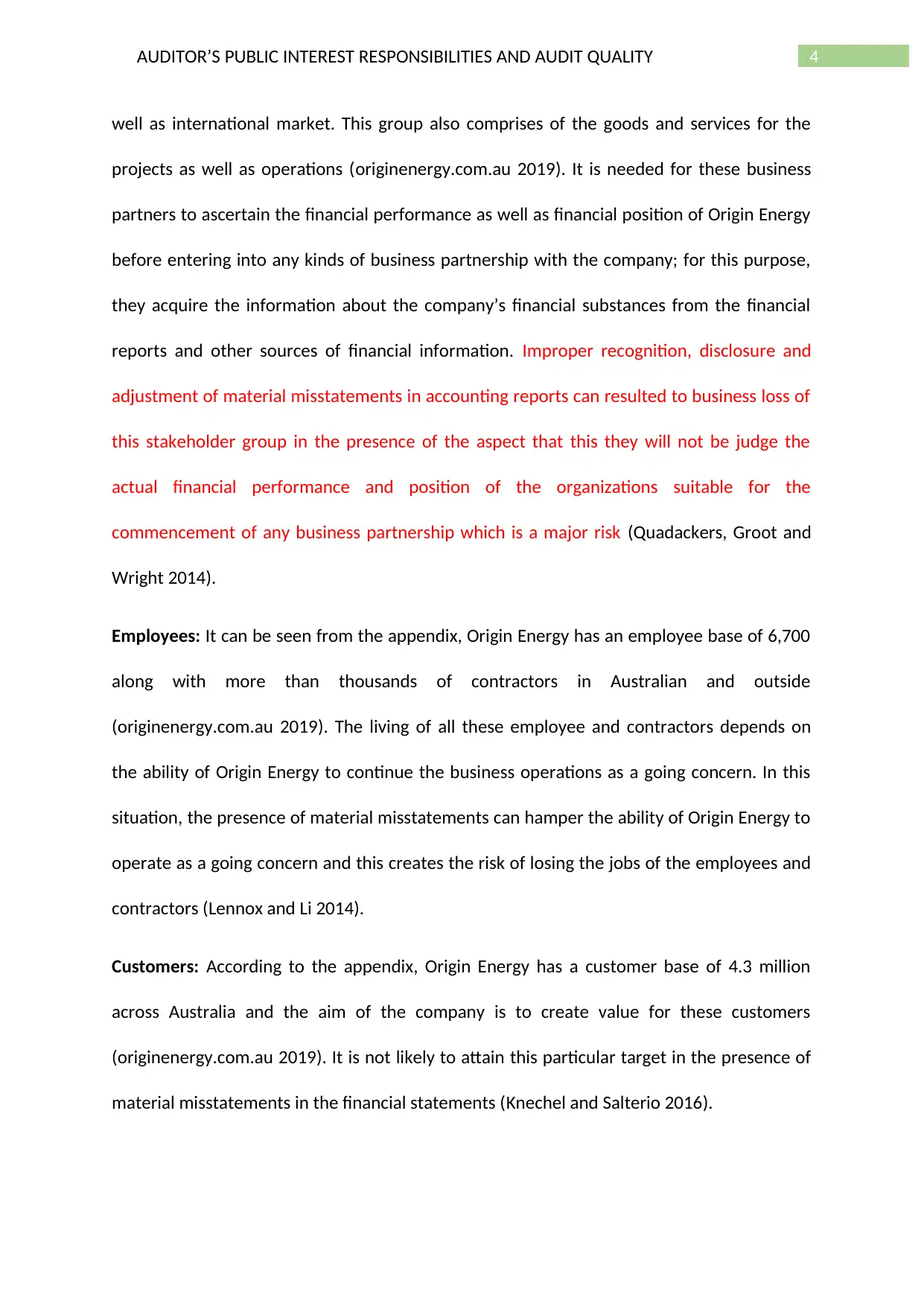
4AUDITOR’S PUBLIC INTEREST RESPONSIBILITIES AND AUDIT QUALITY
well as international market. This group also comprises of the goods and services for the
projects as well as operations (originenergy.com.au 2019). It is needed for these business
partners to ascertain the financial performance as well as financial position of Origin Energy
before entering into any kinds of business partnership with the company; for this purpose,
they acquire the information about the company’s financial substances from the financial
reports and other sources of financial information. Improper recognition, disclosure and
adjustment of material misstatements in accounting reports can resulted to business loss of
this stakeholder group in the presence of the aspect that this they will not be judge the
actual financial performance and position of the organizations suitable for the
commencement of any business partnership which is a major risk (Quadackers, Groot and
Wright 2014).
Employees: It can be seen from the appendix, Origin Energy has an employee base of 6,700
along with more than thousands of contractors in Australian and outside
(originenergy.com.au 2019). The living of all these employee and contractors depends on
the ability of Origin Energy to continue the business operations as a going concern. In this
situation, the presence of material misstatements can hamper the ability of Origin Energy to
operate as a going concern and this creates the risk of losing the jobs of the employees and
contractors (Lennox and Li 2014).
Customers: According to the appendix, Origin Energy has a customer base of 4.3 million
across Australia and the aim of the company is to create value for these customers
(originenergy.com.au 2019). It is not likely to attain this particular target in the presence of
material misstatements in the financial statements (Knechel and Salterio 2016).
well as international market. This group also comprises of the goods and services for the
projects as well as operations (originenergy.com.au 2019). It is needed for these business
partners to ascertain the financial performance as well as financial position of Origin Energy
before entering into any kinds of business partnership with the company; for this purpose,
they acquire the information about the company’s financial substances from the financial
reports and other sources of financial information. Improper recognition, disclosure and
adjustment of material misstatements in accounting reports can resulted to business loss of
this stakeholder group in the presence of the aspect that this they will not be judge the
actual financial performance and position of the organizations suitable for the
commencement of any business partnership which is a major risk (Quadackers, Groot and
Wright 2014).
Employees: It can be seen from the appendix, Origin Energy has an employee base of 6,700
along with more than thousands of contractors in Australian and outside
(originenergy.com.au 2019). The living of all these employee and contractors depends on
the ability of Origin Energy to continue the business operations as a going concern. In this
situation, the presence of material misstatements can hamper the ability of Origin Energy to
operate as a going concern and this creates the risk of losing the jobs of the employees and
contractors (Lennox and Li 2014).
Customers: According to the appendix, Origin Energy has a customer base of 4.3 million
across Australia and the aim of the company is to create value for these customers
(originenergy.com.au 2019). It is not likely to attain this particular target in the presence of
material misstatements in the financial statements (Knechel and Salterio 2016).
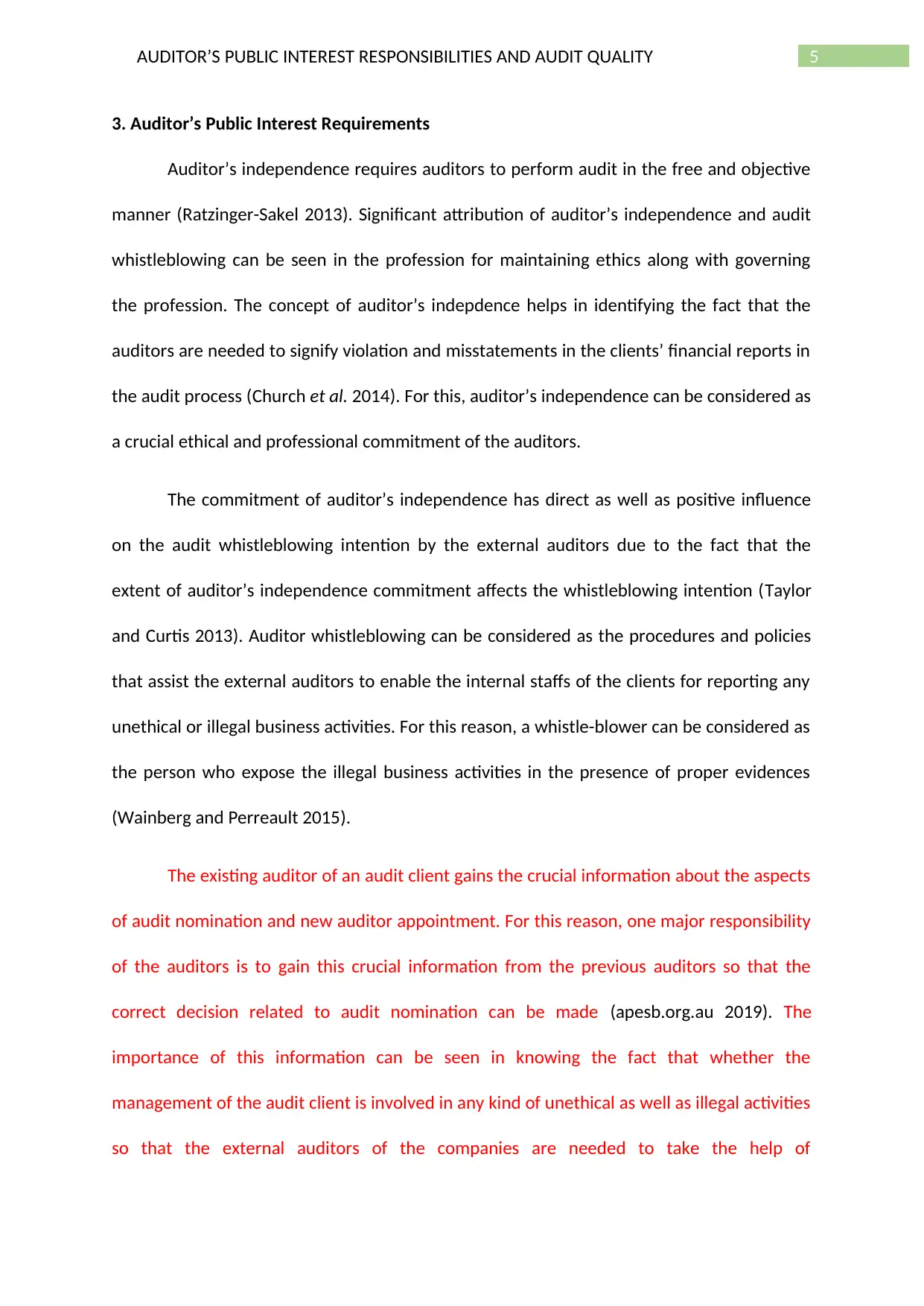
5AUDITOR’S PUBLIC INTEREST RESPONSIBILITIES AND AUDIT QUALITY
3. Auditor’s Public Interest Requirements
Auditor’s independence requires auditors to perform audit in the free and objective
manner (Ratzinger-Sakel 2013). Significant attribution of auditor’s independence and audit
whistleblowing can be seen in the profession for maintaining ethics along with governing
the profession. The concept of auditor’s indepdence helps in identifying the fact that the
auditors are needed to signify violation and misstatements in the clients’ financial reports in
the audit process (Church et al. 2014). For this, auditor’s independence can be considered as
a crucial ethical and professional commitment of the auditors.
The commitment of auditor’s independence has direct as well as positive influence
on the audit whistleblowing intention by the external auditors due to the fact that the
extent of auditor’s independence commitment affects the whistleblowing intention (Taylor
and Curtis 2013). Auditor whistleblowing can be considered as the procedures and policies
that assist the external auditors to enable the internal staffs of the clients for reporting any
unethical or illegal business activities. For this reason, a whistle-blower can be considered as
the person who expose the illegal business activities in the presence of proper evidences
(Wainberg and Perreault 2015).
The existing auditor of an audit client gains the crucial information about the aspects
of audit nomination and new auditor appointment. For this reason, one major responsibility
of the auditors is to gain this crucial information from the previous auditors so that the
correct decision related to audit nomination can be made (apesb.org.au 2019). The
importance of this information can be seen in knowing the fact that whether the
management of the audit client is involved in any kind of unethical as well as illegal activities
so that the external auditors of the companies are needed to take the help of
3. Auditor’s Public Interest Requirements
Auditor’s independence requires auditors to perform audit in the free and objective
manner (Ratzinger-Sakel 2013). Significant attribution of auditor’s independence and audit
whistleblowing can be seen in the profession for maintaining ethics along with governing
the profession. The concept of auditor’s indepdence helps in identifying the fact that the
auditors are needed to signify violation and misstatements in the clients’ financial reports in
the audit process (Church et al. 2014). For this, auditor’s independence can be considered as
a crucial ethical and professional commitment of the auditors.
The commitment of auditor’s independence has direct as well as positive influence
on the audit whistleblowing intention by the external auditors due to the fact that the
extent of auditor’s independence commitment affects the whistleblowing intention (Taylor
and Curtis 2013). Auditor whistleblowing can be considered as the procedures and policies
that assist the external auditors to enable the internal staffs of the clients for reporting any
unethical or illegal business activities. For this reason, a whistle-blower can be considered as
the person who expose the illegal business activities in the presence of proper evidences
(Wainberg and Perreault 2015).
The existing auditor of an audit client gains the crucial information about the aspects
of audit nomination and new auditor appointment. For this reason, one major responsibility
of the auditors is to gain this crucial information from the previous auditors so that the
correct decision related to audit nomination can be made (apesb.org.au 2019). The
importance of this information can be seen in knowing the fact that whether the
management of the audit client is involved in any kind of unethical as well as illegal activities
so that the external auditors of the companies are needed to take the help of
⊘ This is a preview!⊘
Do you want full access?
Subscribe today to unlock all pages.

Trusted by 1+ million students worldwide
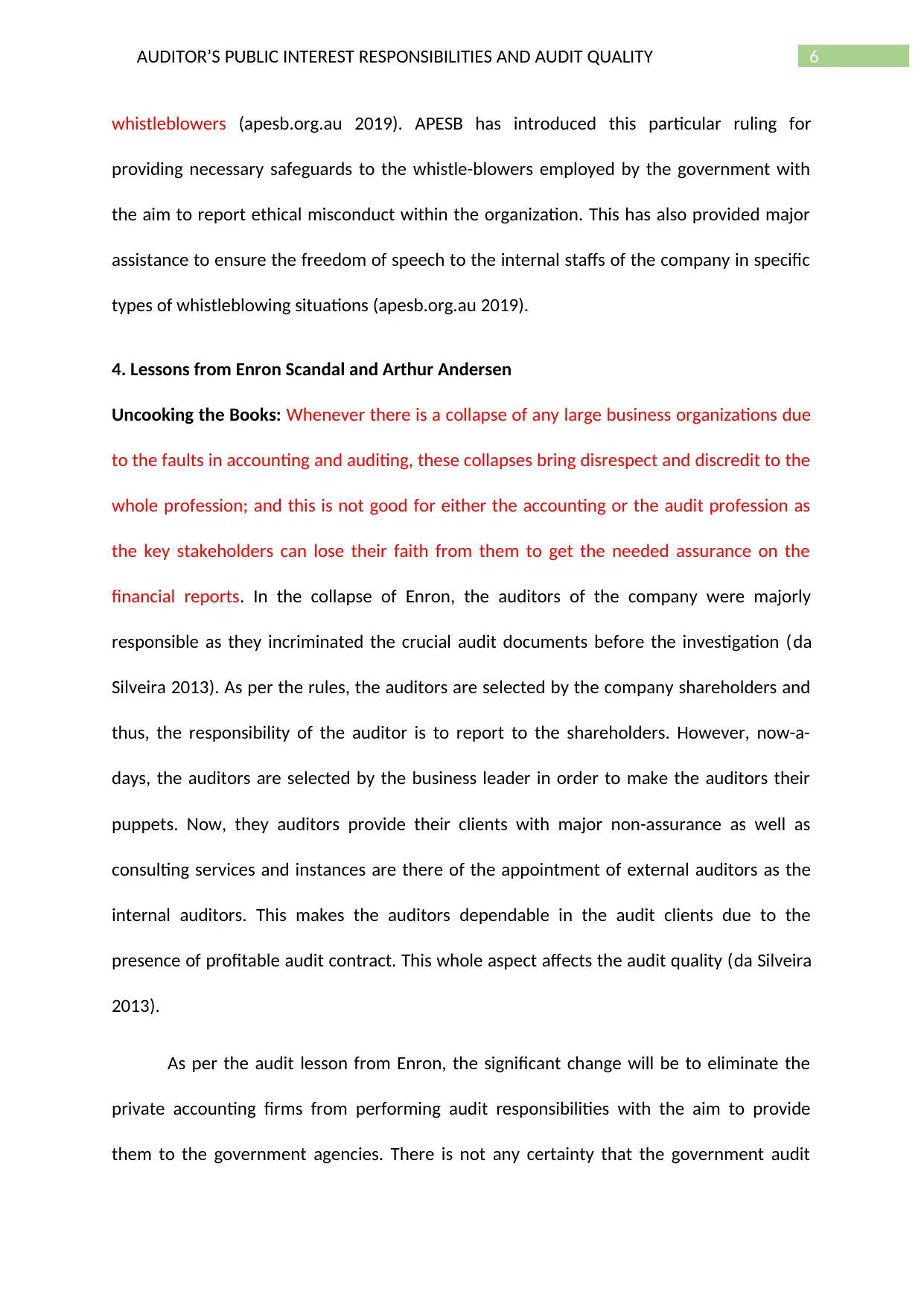
6AUDITOR’S PUBLIC INTEREST RESPONSIBILITIES AND AUDIT QUALITY
whistleblowers (apesb.org.au 2019). APESB has introduced this particular ruling for
providing necessary safeguards to the whistle-blowers employed by the government with
the aim to report ethical misconduct within the organization. This has also provided major
assistance to ensure the freedom of speech to the internal staffs of the company in specific
types of whistleblowing situations (apesb.org.au 2019).
4. Lessons from Enron Scandal and Arthur Andersen
Uncooking the Books: Whenever there is a collapse of any large business organizations due
to the faults in accounting and auditing, these collapses bring disrespect and discredit to the
whole profession; and this is not good for either the accounting or the audit profession as
the key stakeholders can lose their faith from them to get the needed assurance on the
financial reports. In the collapse of Enron, the auditors of the company were majorly
responsible as they incriminated the crucial audit documents before the investigation (da
Silveira 2013). As per the rules, the auditors are selected by the company shareholders and
thus, the responsibility of the auditor is to report to the shareholders. However, now-a-
days, the auditors are selected by the business leader in order to make the auditors their
puppets. Now, they auditors provide their clients with major non-assurance as well as
consulting services and instances are there of the appointment of external auditors as the
internal auditors. This makes the auditors dependable in the audit clients due to the
presence of profitable audit contract. This whole aspect affects the audit quality (da Silveira
2013).
As per the audit lesson from Enron, the significant change will be to eliminate the
private accounting firms from performing audit responsibilities with the aim to provide
them to the government agencies. There is not any certainty that the government audit
whistleblowers (apesb.org.au 2019). APESB has introduced this particular ruling for
providing necessary safeguards to the whistle-blowers employed by the government with
the aim to report ethical misconduct within the organization. This has also provided major
assistance to ensure the freedom of speech to the internal staffs of the company in specific
types of whistleblowing situations (apesb.org.au 2019).
4. Lessons from Enron Scandal and Arthur Andersen
Uncooking the Books: Whenever there is a collapse of any large business organizations due
to the faults in accounting and auditing, these collapses bring disrespect and discredit to the
whole profession; and this is not good for either the accounting or the audit profession as
the key stakeholders can lose their faith from them to get the needed assurance on the
financial reports. In the collapse of Enron, the auditors of the company were majorly
responsible as they incriminated the crucial audit documents before the investigation (da
Silveira 2013). As per the rules, the auditors are selected by the company shareholders and
thus, the responsibility of the auditor is to report to the shareholders. However, now-a-
days, the auditors are selected by the business leader in order to make the auditors their
puppets. Now, they auditors provide their clients with major non-assurance as well as
consulting services and instances are there of the appointment of external auditors as the
internal auditors. This makes the auditors dependable in the audit clients due to the
presence of profitable audit contract. This whole aspect affects the audit quality (da Silveira
2013).
As per the audit lesson from Enron, the significant change will be to eliminate the
private accounting firms from performing audit responsibilities with the aim to provide
them to the government agencies. There is not any certainty that the government audit
Paraphrase This Document
Need a fresh take? Get an instant paraphrase of this document with our AI Paraphraser
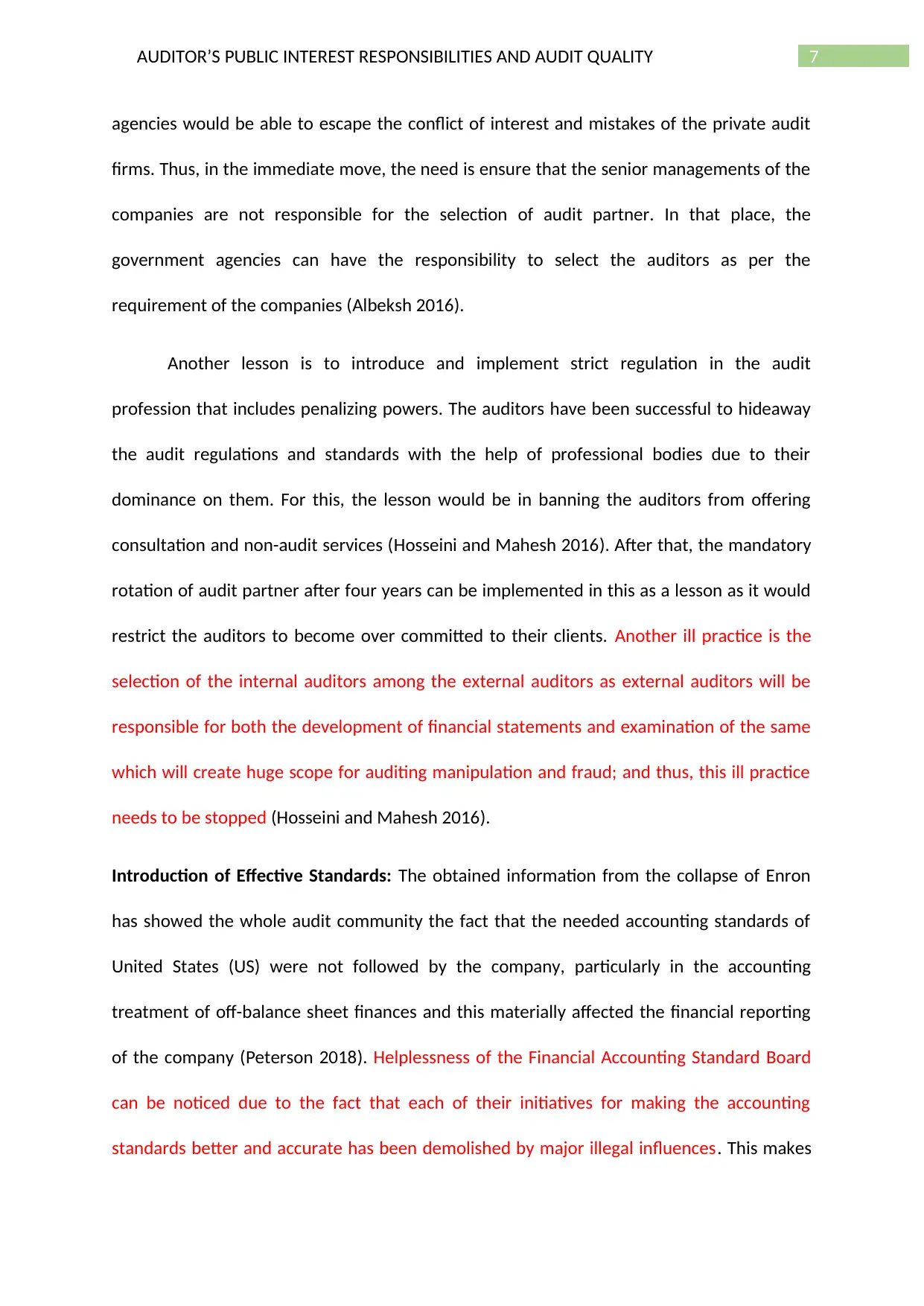
7AUDITOR’S PUBLIC INTEREST RESPONSIBILITIES AND AUDIT QUALITY
agencies would be able to escape the conflict of interest and mistakes of the private audit
firms. Thus, in the immediate move, the need is ensure that the senior managements of the
companies are not responsible for the selection of audit partner. In that place, the
government agencies can have the responsibility to select the auditors as per the
requirement of the companies (Albeksh 2016).
Another lesson is to introduce and implement strict regulation in the audit
profession that includes penalizing powers. The auditors have been successful to hideaway
the audit regulations and standards with the help of professional bodies due to their
dominance on them. For this, the lesson would be in banning the auditors from offering
consultation and non-audit services (Hosseini and Mahesh 2016). After that, the mandatory
rotation of audit partner after four years can be implemented in this as a lesson as it would
restrict the auditors to become over committed to their clients. Another ill practice is the
selection of the internal auditors among the external auditors as external auditors will be
responsible for both the development of financial statements and examination of the same
which will create huge scope for auditing manipulation and fraud; and thus, this ill practice
needs to be stopped (Hosseini and Mahesh 2016).
Introduction of Effective Standards: The obtained information from the collapse of Enron
has showed the whole audit community the fact that the needed accounting standards of
United States (US) were not followed by the company, particularly in the accounting
treatment of off-balance sheet finances and this materially affected the financial reporting
of the company (Peterson 2018). Helplessness of the Financial Accounting Standard Board
can be noticed due to the fact that each of their initiatives for making the accounting
standards better and accurate has been demolished by major illegal influences. This makes
agencies would be able to escape the conflict of interest and mistakes of the private audit
firms. Thus, in the immediate move, the need is ensure that the senior managements of the
companies are not responsible for the selection of audit partner. In that place, the
government agencies can have the responsibility to select the auditors as per the
requirement of the companies (Albeksh 2016).
Another lesson is to introduce and implement strict regulation in the audit
profession that includes penalizing powers. The auditors have been successful to hideaway
the audit regulations and standards with the help of professional bodies due to their
dominance on them. For this, the lesson would be in banning the auditors from offering
consultation and non-audit services (Hosseini and Mahesh 2016). After that, the mandatory
rotation of audit partner after four years can be implemented in this as a lesson as it would
restrict the auditors to become over committed to their clients. Another ill practice is the
selection of the internal auditors among the external auditors as external auditors will be
responsible for both the development of financial statements and examination of the same
which will create huge scope for auditing manipulation and fraud; and thus, this ill practice
needs to be stopped (Hosseini and Mahesh 2016).
Introduction of Effective Standards: The obtained information from the collapse of Enron
has showed the whole audit community the fact that the needed accounting standards of
United States (US) were not followed by the company, particularly in the accounting
treatment of off-balance sheet finances and this materially affected the financial reporting
of the company (Peterson 2018). Helplessness of the Financial Accounting Standard Board
can be noticed due to the fact that each of their initiatives for making the accounting
standards better and accurate has been demolished by major illegal influences. This makes
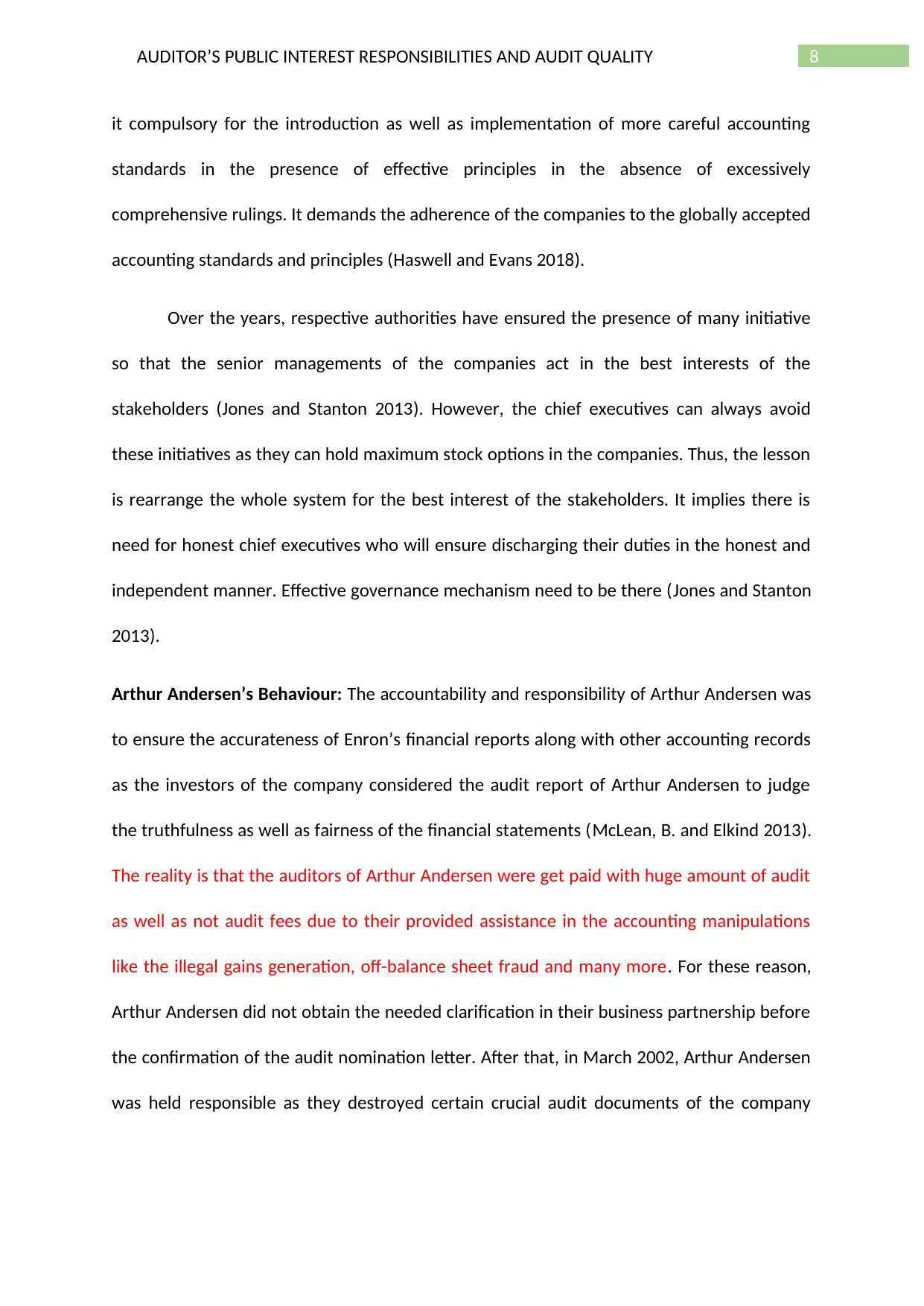
8AUDITOR’S PUBLIC INTEREST RESPONSIBILITIES AND AUDIT QUALITY
it compulsory for the introduction as well as implementation of more careful accounting
standards in the presence of effective principles in the absence of excessively
comprehensive rulings. It demands the adherence of the companies to the globally accepted
accounting standards and principles (Haswell and Evans 2018).
Over the years, respective authorities have ensured the presence of many initiative
so that the senior managements of the companies act in the best interests of the
stakeholders (Jones and Stanton 2013). However, the chief executives can always avoid
these initiatives as they can hold maximum stock options in the companies. Thus, the lesson
is rearrange the whole system for the best interest of the stakeholders. It implies there is
need for honest chief executives who will ensure discharging their duties in the honest and
independent manner. Effective governance mechanism need to be there (Jones and Stanton
2013).
Arthur Andersen’s Behaviour: The accountability and responsibility of Arthur Andersen was
to ensure the accurateness of Enron’s financial reports along with other accounting records
as the investors of the company considered the audit report of Arthur Andersen to judge
the truthfulness as well as fairness of the financial statements (McLean, B. and Elkind 2013).
The reality is that the auditors of Arthur Andersen were get paid with huge amount of audit
as well as not audit fees due to their provided assistance in the accounting manipulations
like the illegal gains generation, off-balance sheet fraud and many more. For these reason,
Arthur Andersen did not obtain the needed clarification in their business partnership before
the confirmation of the audit nomination letter. After that, in March 2002, Arthur Andersen
was held responsible as they destroyed certain crucial audit documents of the company
it compulsory for the introduction as well as implementation of more careful accounting
standards in the presence of effective principles in the absence of excessively
comprehensive rulings. It demands the adherence of the companies to the globally accepted
accounting standards and principles (Haswell and Evans 2018).
Over the years, respective authorities have ensured the presence of many initiative
so that the senior managements of the companies act in the best interests of the
stakeholders (Jones and Stanton 2013). However, the chief executives can always avoid
these initiatives as they can hold maximum stock options in the companies. Thus, the lesson
is rearrange the whole system for the best interest of the stakeholders. It implies there is
need for honest chief executives who will ensure discharging their duties in the honest and
independent manner. Effective governance mechanism need to be there (Jones and Stanton
2013).
Arthur Andersen’s Behaviour: The accountability and responsibility of Arthur Andersen was
to ensure the accurateness of Enron’s financial reports along with other accounting records
as the investors of the company considered the audit report of Arthur Andersen to judge
the truthfulness as well as fairness of the financial statements (McLean, B. and Elkind 2013).
The reality is that the auditors of Arthur Andersen were get paid with huge amount of audit
as well as not audit fees due to their provided assistance in the accounting manipulations
like the illegal gains generation, off-balance sheet fraud and many more. For these reason,
Arthur Andersen did not obtain the needed clarification in their business partnership before
the confirmation of the audit nomination letter. After that, in March 2002, Arthur Andersen
was held responsible as they destroyed certain crucial audit documents of the company
⊘ This is a preview!⊘
Do you want full access?
Subscribe today to unlock all pages.

Trusted by 1+ million students worldwide
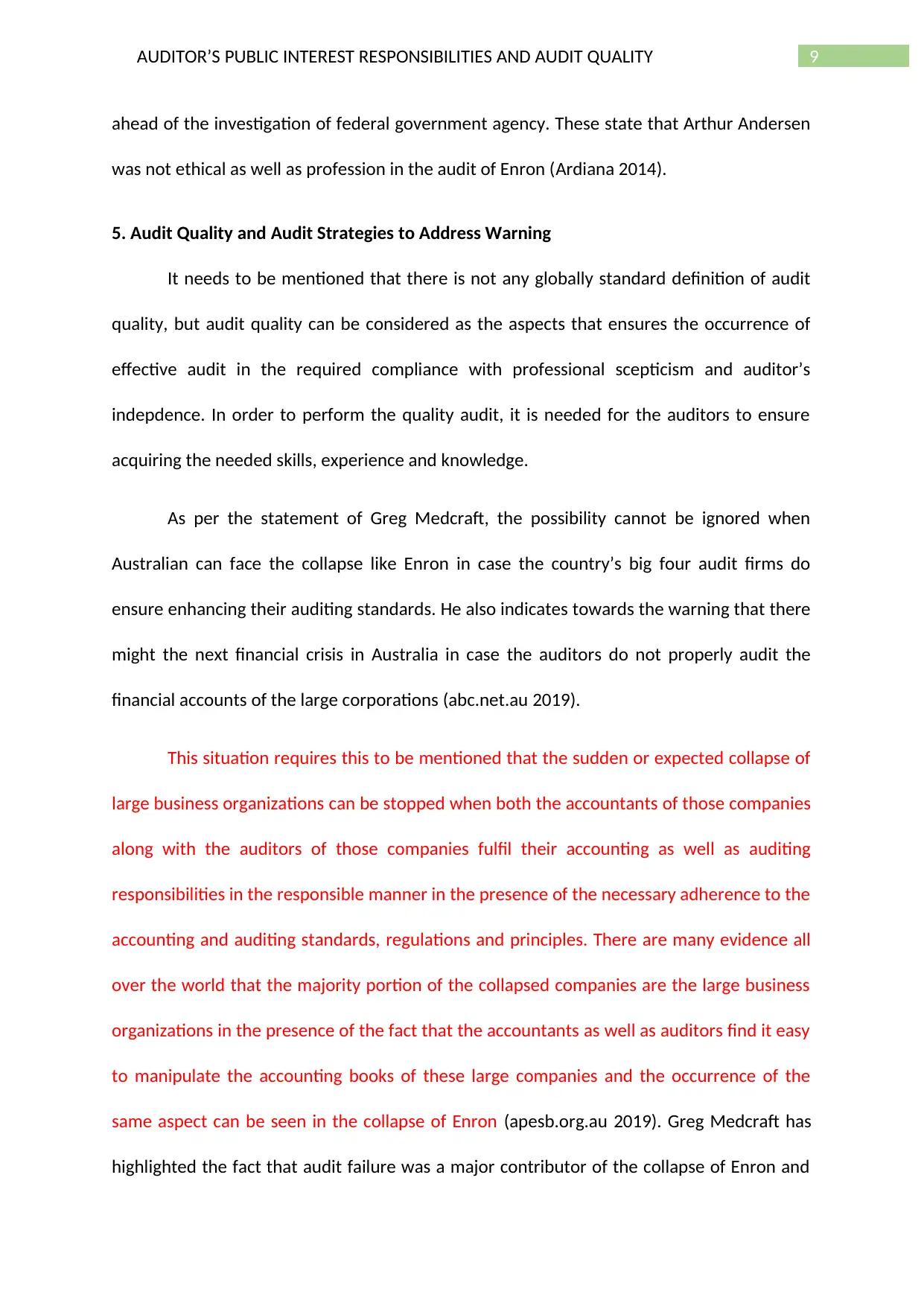
9AUDITOR’S PUBLIC INTEREST RESPONSIBILITIES AND AUDIT QUALITY
ahead of the investigation of federal government agency. These state that Arthur Andersen
was not ethical as well as profession in the audit of Enron (Ardiana 2014).
5. Audit Quality and Audit Strategies to Address Warning
It needs to be mentioned that there is not any globally standard definition of audit
quality, but audit quality can be considered as the aspects that ensures the occurrence of
effective audit in the required compliance with professional scepticism and auditor’s
indepdence. In order to perform the quality audit, it is needed for the auditors to ensure
acquiring the needed skills, experience and knowledge.
As per the statement of Greg Medcraft, the possibility cannot be ignored when
Australian can face the collapse like Enron in case the country’s big four audit firms do
ensure enhancing their auditing standards. He also indicates towards the warning that there
might the next financial crisis in Australia in case the auditors do not properly audit the
financial accounts of the large corporations (abc.net.au 2019).
This situation requires this to be mentioned that the sudden or expected collapse of
large business organizations can be stopped when both the accountants of those companies
along with the auditors of those companies fulfil their accounting as well as auditing
responsibilities in the responsible manner in the presence of the necessary adherence to the
accounting and auditing standards, regulations and principles. There are many evidence all
over the world that the majority portion of the collapsed companies are the large business
organizations in the presence of the fact that the accountants as well as auditors find it easy
to manipulate the accounting books of these large companies and the occurrence of the
same aspect can be seen in the collapse of Enron (apesb.org.au 2019). Greg Medcraft has
highlighted the fact that audit failure was a major contributor of the collapse of Enron and
ahead of the investigation of federal government agency. These state that Arthur Andersen
was not ethical as well as profession in the audit of Enron (Ardiana 2014).
5. Audit Quality and Audit Strategies to Address Warning
It needs to be mentioned that there is not any globally standard definition of audit
quality, but audit quality can be considered as the aspects that ensures the occurrence of
effective audit in the required compliance with professional scepticism and auditor’s
indepdence. In order to perform the quality audit, it is needed for the auditors to ensure
acquiring the needed skills, experience and knowledge.
As per the statement of Greg Medcraft, the possibility cannot be ignored when
Australian can face the collapse like Enron in case the country’s big four audit firms do
ensure enhancing their auditing standards. He also indicates towards the warning that there
might the next financial crisis in Australia in case the auditors do not properly audit the
financial accounts of the large corporations (abc.net.au 2019).
This situation requires this to be mentioned that the sudden or expected collapse of
large business organizations can be stopped when both the accountants of those companies
along with the auditors of those companies fulfil their accounting as well as auditing
responsibilities in the responsible manner in the presence of the necessary adherence to the
accounting and auditing standards, regulations and principles. There are many evidence all
over the world that the majority portion of the collapsed companies are the large business
organizations in the presence of the fact that the accountants as well as auditors find it easy
to manipulate the accounting books of these large companies and the occurrence of the
same aspect can be seen in the collapse of Enron (apesb.org.au 2019). Greg Medcraft has
highlighted the fact that audit failure was a major contributor of the collapse of Enron and
Paraphrase This Document
Need a fresh take? Get an instant paraphrase of this document with our AI Paraphraser

10AUDITOR’S PUBLIC INTEREST RESPONSIBILITIES AND AUDIT QUALITY
this audit failure also hugely contributed towards the financial crisis. For this reason, it is
needed for the auditors to show their responsibility and accountability to provide the
various stakeholders with the needed information by conducting the audit in the most
responsible manner (Bell, Causholli and Knechel 2015).
The provided news article shows that even the auditors of the large as well as
reputed audit firms in Australia have drastically failed in performing the audit of the large
business corporation and it can be considered as a major failure for them, especially for the
whole audit community as well as profession (abc.net.au 2019). It indicates towards the fact
that the auditors are gradually stepping aside from their primary responsibility that is to
ensure the fact that whether there is any material misstatements in the financial statements
or not in the presence of their personal benefits with the audit clients and becoming the
puppet of the clients. It cannot be considered as a good sign for the companies (Christensen
et al. 2016). For example, accounting fraud was majorly responsible for the collapse of
Enron and the collapse of the company also had negative impact on the audit firm, Arthur
Andersen.
It is visible from the statement of Greg Medcraft that 7000 surveillance and more
than 1000 investigations were conducted by ASIC due to the fact that these investigations as
well as surveillances are majorly helpful in the detection of the errors and the fraudulent
activities in the financial statements. The result of these investigations was theprohibition as
well as confined numerous number of organizational staffs when refunded more than $1.3
billion to the investors (abc.net.au 2019). The outgoing chairman of ASIC, Greg Medctaft,
handed the responsibility to complete the unfinished tasks to the federal government of
Australia (abc.net.au 2019). For this, these individuals need to be imposed with criminal as
this audit failure also hugely contributed towards the financial crisis. For this reason, it is
needed for the auditors to show their responsibility and accountability to provide the
various stakeholders with the needed information by conducting the audit in the most
responsible manner (Bell, Causholli and Knechel 2015).
The provided news article shows that even the auditors of the large as well as
reputed audit firms in Australia have drastically failed in performing the audit of the large
business corporation and it can be considered as a major failure for them, especially for the
whole audit community as well as profession (abc.net.au 2019). It indicates towards the fact
that the auditors are gradually stepping aside from their primary responsibility that is to
ensure the fact that whether there is any material misstatements in the financial statements
or not in the presence of their personal benefits with the audit clients and becoming the
puppet of the clients. It cannot be considered as a good sign for the companies (Christensen
et al. 2016). For example, accounting fraud was majorly responsible for the collapse of
Enron and the collapse of the company also had negative impact on the audit firm, Arthur
Andersen.
It is visible from the statement of Greg Medcraft that 7000 surveillance and more
than 1000 investigations were conducted by ASIC due to the fact that these investigations as
well as surveillances are majorly helpful in the detection of the errors and the fraudulent
activities in the financial statements. The result of these investigations was theprohibition as
well as confined numerous number of organizational staffs when refunded more than $1.3
billion to the investors (abc.net.au 2019). The outgoing chairman of ASIC, Greg Medctaft,
handed the responsibility to complete the unfinished tasks to the federal government of
Australia (abc.net.au 2019). For this, these individuals need to be imposed with criminal as
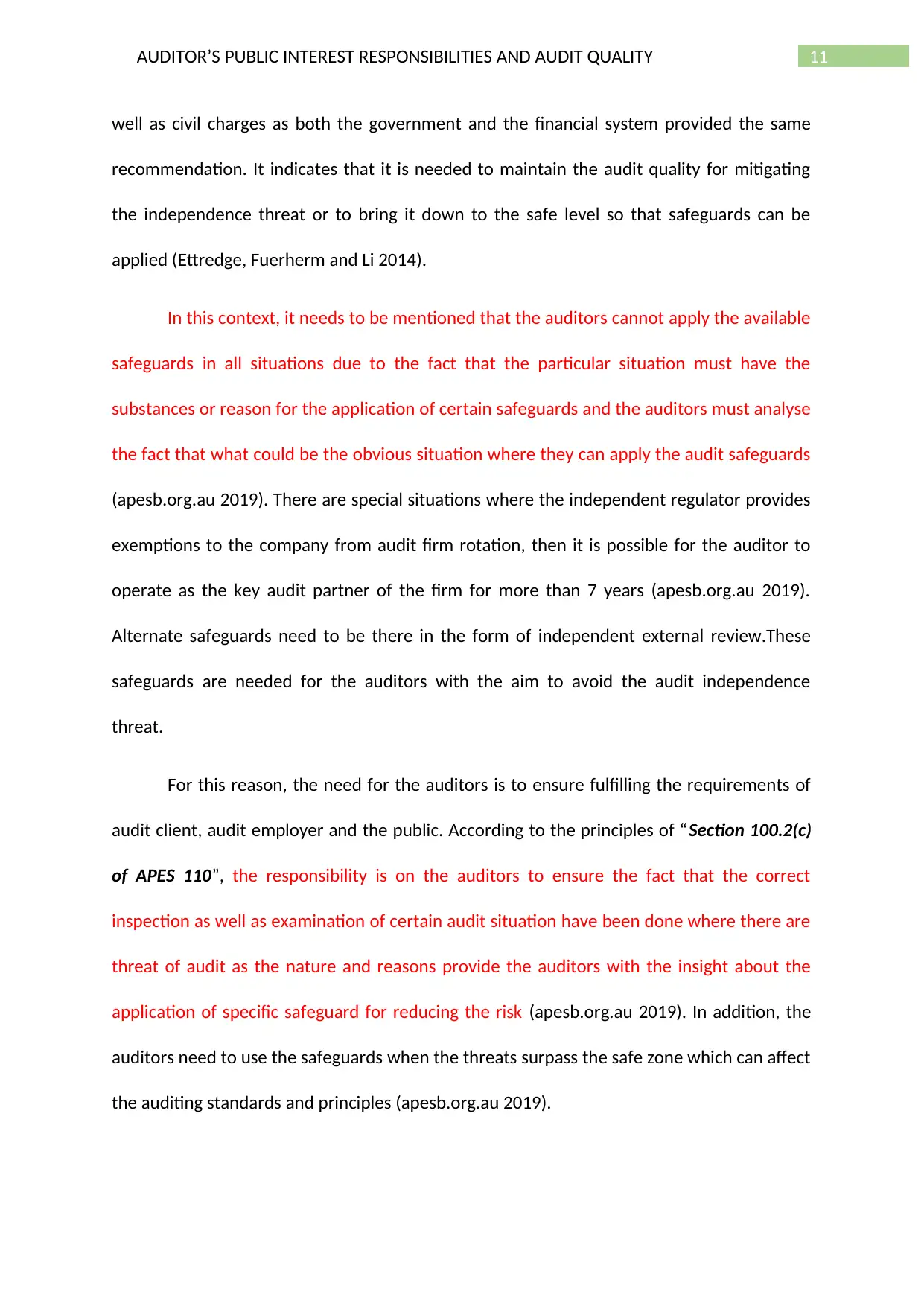
11AUDITOR’S PUBLIC INTEREST RESPONSIBILITIES AND AUDIT QUALITY
well as civil charges as both the government and the financial system provided the same
recommendation. It indicates that it is needed to maintain the audit quality for mitigating
the independence threat or to bring it down to the safe level so that safeguards can be
applied (Ettredge, Fuerherm and Li 2014).
In this context, it needs to be mentioned that the auditors cannot apply the available
safeguards in all situations due to the fact that the particular situation must have the
substances or reason for the application of certain safeguards and the auditors must analyse
the fact that what could be the obvious situation where they can apply the audit safeguards
(apesb.org.au 2019). There are special situations where the independent regulator provides
exemptions to the company from audit firm rotation, then it is possible for the auditor to
operate as the key audit partner of the firm for more than 7 years (apesb.org.au 2019).
Alternate safeguards need to be there in the form of independent external review.These
safeguards are needed for the auditors with the aim to avoid the audit independence
threat.
For this reason, the need for the auditors is to ensure fulfilling the requirements of
audit client, audit employer and the public. According to the principles of “Section 100.2(c)
of APES 110”, the responsibility is on the auditors to ensure the fact that the correct
inspection as well as examination of certain audit situation have been done where there are
threat of audit as the nature and reasons provide the auditors with the insight about the
application of specific safeguard for reducing the risk (apesb.org.au 2019). In addition, the
auditors need to use the safeguards when the threats surpass the safe zone which can affect
the auditing standards and principles (apesb.org.au 2019).
well as civil charges as both the government and the financial system provided the same
recommendation. It indicates that it is needed to maintain the audit quality for mitigating
the independence threat or to bring it down to the safe level so that safeguards can be
applied (Ettredge, Fuerherm and Li 2014).
In this context, it needs to be mentioned that the auditors cannot apply the available
safeguards in all situations due to the fact that the particular situation must have the
substances or reason for the application of certain safeguards and the auditors must analyse
the fact that what could be the obvious situation where they can apply the audit safeguards
(apesb.org.au 2019). There are special situations where the independent regulator provides
exemptions to the company from audit firm rotation, then it is possible for the auditor to
operate as the key audit partner of the firm for more than 7 years (apesb.org.au 2019).
Alternate safeguards need to be there in the form of independent external review.These
safeguards are needed for the auditors with the aim to avoid the audit independence
threat.
For this reason, the need for the auditors is to ensure fulfilling the requirements of
audit client, audit employer and the public. According to the principles of “Section 100.2(c)
of APES 110”, the responsibility is on the auditors to ensure the fact that the correct
inspection as well as examination of certain audit situation have been done where there are
threat of audit as the nature and reasons provide the auditors with the insight about the
application of specific safeguard for reducing the risk (apesb.org.au 2019). In addition, the
auditors need to use the safeguards when the threats surpass the safe zone which can affect
the auditing standards and principles (apesb.org.au 2019).
⊘ This is a preview!⊘
Do you want full access?
Subscribe today to unlock all pages.

Trusted by 1+ million students worldwide
1 out of 19
Related Documents
Your All-in-One AI-Powered Toolkit for Academic Success.
+13062052269
info@desklib.com
Available 24*7 on WhatsApp / Email
![[object Object]](/_next/static/media/star-bottom.7253800d.svg)
Unlock your academic potential
Copyright © 2020–2026 A2Z Services. All Rights Reserved. Developed and managed by ZUCOL.





